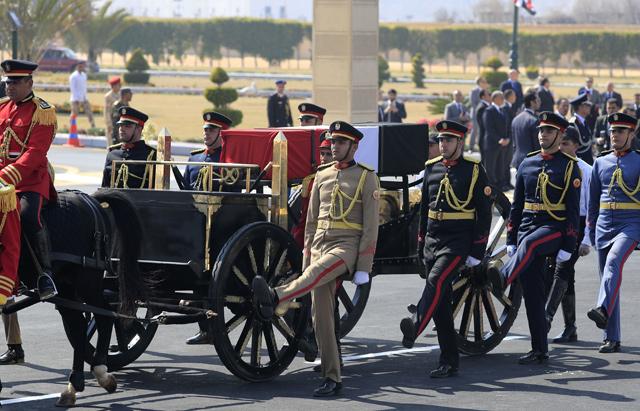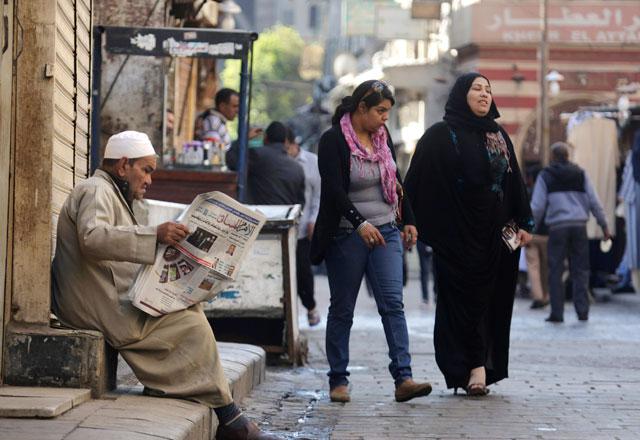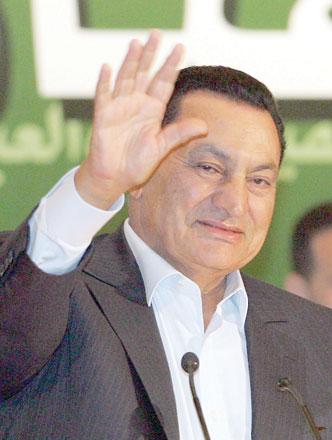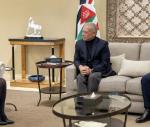You are here
Egypt’s Sisi pays respect to Mubarak at military funeral
By AFP - Feb 26,2020 - Last updated at Feb 26,2020

Egyptian honour guards escort the coffin of former president Hosni Mubarak during his funeral ceremony at Cairo's Mosheer Tantawy Mosque in the eastern outskirts of the Egyptian capital on Wednesday (AFP photo)
CAIRO — Egypt's President Abdel Fattah Al Sisi paid his respects on Wednesday at the military funeral of former president Hosni Mubarak, whose three decades of rule ended in the Arab Spring protests of 2011.
The presidential office declared three days of mourning for the veteran head of state, who died aged 91 in a Cairo military hospital on Tuesday.
The funeral focused not on Mubarak's political legacy but on the military career of the Soviet-trained fighter pilot who commanded Egypt's air force during the 1973 war with Israel.
A military helicopter delivered Mubarak's coffin, which was draped in an Egyptian flag and then mounted on horse-drawn carriage at Cairo's Mosheer Tantawi Mosque.
Sisi led the military procession, flanked by the state's top religious and political figures.
Officers carried Mubarak's war medals and cannons fired a 21-shot salute before the coffin was later lowered into the ground in the family cemetery in Heliopolis in east Cairo.
Sisi, who did not address the ceremony, shook hands with Mubarak's mournful sons Alaa and Gamal.
Dozens of Mubarak supporters came to mourn, among them Tharwat Hassan, 59, an office manager from Menufiyah, the governorate Mubarak hailed from.
"He lived to see the day his sons were cleared," Hassan said. He then pointed to torrential rains that drenched Cairo early this week, saying it was "as if the skies were crying for him".
"Hosni Mubarak was not just a statesman, he was the true embodiment of the state."
"Mubarak in God's hands," read the front-page headline of state newspaper Al Ahram, with a black stripe cutting across a photograph of the veteran ruler.
The funeral was carried live on local television channels, where prominent commentators praised Mubarak's legacy in glowing tones.
The former air force chief and vice president became head of state in 1981 after militants assassinated his predecessor Anwar Sadat during a military parade.
Mubarak, who was sitting next to him, was wounded. He would survive several more attempts on his life, including in 1995 when militants sprayed his motorcade with bullets at a roadblock in Ethiopia.
As Mubarak went on to lead the North African country, he relied heavily on the armed forces and security services to ensure stability and security, while promoting close ties with the United States and keeping Egypt's peace with Israel.
.In the post-Mubarak years, Egypt was torn by political turmoil — bloody unrest in the streets, the short-lived rule of Islamist president Mohamed Morsi, and his 2013 ouster by Sisi, another military man.
Mubarak's full-honours military funeral contrasted with the low-key burial of Morsi, the Muslim Brotherhood president.
Mohamed Amin, a columnist for the biggest privately owned daily, Al Masry Youm, wrote that "you can agree or disagree with the departed president, but one thing is for sure: Mubarak never betrayed his country".
He compared Mubarak's fate with those of other Arab rulers in Libya, Yemen, Iraq and Tunisia, writing that "his end was unlike Qadhafi, Ali Abdullah Saleh or Saddam Hussein. He did not seek asylum like Ben Ali.
"He said he would live here and die here."
Related Articles
The office of Egypt's public prosecutor said Tuesday it will appeal a court decision to drop a murder charge against ex-president Hosni Mubarak over the deaths of protesters during the 2011 uprising.
CAIRO — Egypt's former president Hosni Mubarak, who ruled for three decades before he was ousted amid the Arab Spring protests in 2011, died
CAIRO — Egypt's president paid tribute on Sunday to the country's 2011 uprising that toppled longtime ruler Hosni Mubarak, saying that prote

















